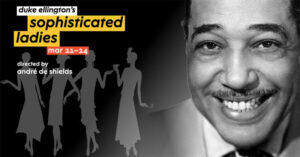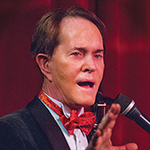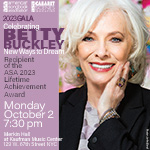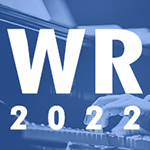Sophisticated Ladies
New Jersey Performing Arts Center, Newark, NJ, March 21, 2019
Reviewed by Marilyn Lester for Cabaret Scenes
 Duke Ellington famously wrote “It Don’t Mean a Thing If It Ain’t Got That Swing.” He was right. This “revival” of Broadway’s Tony award-winning 1981 hit revue, Sophisticated Ladies, at the New Jersey Performing Arts Center (co-produced with New Jersey’s Crossroads Theater Company, March 21-24) was devoid of swing from the top hat down––lacking not only that feeling of jazz but the genius of the one-and-only Duke Ellington.
Duke Ellington famously wrote “It Don’t Mean a Thing If It Ain’t Got That Swing.” He was right. This “revival” of Broadway’s Tony award-winning 1981 hit revue, Sophisticated Ladies, at the New Jersey Performing Arts Center (co-produced with New Jersey’s Crossroads Theater Company, March 21-24) was devoid of swing from the top hat down––lacking not only that feeling of jazz but the genius of the one-and-only Duke Ellington.
This isn’t to say the production didn’t hit some high notes. The ensemble cast (Johmaalya Adelekan, Ken Ard, Jacqueline Arnold, Wesley Barnes, Lamont Brown, Kaleigh Cronin, Lianne Marie Dobbs, C.K. Edwards, Danielle Kelsey, Jenny Laroche, N’Kenge, and Tommy Scrivens) was delightfully talented if largely misused. The brightest spot was the quartet of males (Barnes, Brown, Edwards, and Scrivens) serving chiefly as dancers who shone especially on their spotlight number, “I’ve Got to Be a Rug Cutter.” The second act, which fared much better than the first, nicely showcased a witty “Bli-Blip” (lyrics by Sid Kuller), an animated “I’m Just a Lucky So-and-So” (lyrics by Mack David), and a lively “I’m Beginning to See the Light” (music by Ellington, Harry James and Johnny Hodges and lyrics by Don George).
Choreography, a combination of tap and movement by Kimberly Schafer, leaned far into the pedestrian, while vocals were uneven and all too frequently over-wrought, particularly “I Got It Bad (and That Ain’t Good) (lyrics by Paul Francis Webster) and “Do Nothing Till You Hear from Me” (lyrics by Bob Russell). An exception to the Dreamgirls belting style was a restrained “Lush Life” (music and lyrics by Billy Strayhorn, and not in the original 1981 production), blessedly delivered as it should be. Conceptual misfires abounded, including “In a Sentimental Mood” (lyrics by Manny Kurtz) presented as a ménage-a-trois, the instrumental “The Mooche” (which Ellington himself said characterized “a certain lazy gait peculiar to some of the folk of Harlem”) conceived as an African tribal dance, and Juan Tizol’s “Caravan” presided over by an Egyptian Pharaoh and his court.
Most dismaying was the 10-member band led by music director and pianist Nat Adderley, Jr. Sloppy and uninspired playing was abetted by often odd and sometimes incomprehensible arrangements. One number, vocally executed in the style of Ellington’s vocal-effects piece, “Creole Love Call” (Ellington and Bubber Miley) was nearly unidentifiable and may well have been “Echoes of Harlem,” perhaps. Vocals were at the mercy of imbalances in sound design (uncredited), while lighting designer Burke Wilmore had little to spark his imagination save the set––a bandstand bisected by a staircase leading from an upper level performance platform to the stage, backed by an Art Deco “fan,” which came to life from time to time though light changes. Costumes by Gail Brassard were a visual treat, lifting an otherwise generally lackluster production.
Director André De Shields’ vision for the production was one that “subtly reflects the changing status of the female over various windows of time. The entire physical production is meant to be minimalist in order to emphasize our investigation: “what does the authentic sophisticated lady have to say about herself?” While minimalism was painfully evident, the disjointed nature of the production didn’t inform the modern woman––point lost. De Shields is an extraordinarily talented man as a performer and as a director. This presentation of Sophisticated Ladies suffered perhaps from a lack of sufficiently focused attention. It may well be that the uncharacteristic derailing of Ellington can be attributed to De Shields’ simultaneous, heavy undertaking in Hadestown––a major musical he’s starring in, which opened with its first preview on March 22. As a wise man once said, “a house divided cannot stand.”





